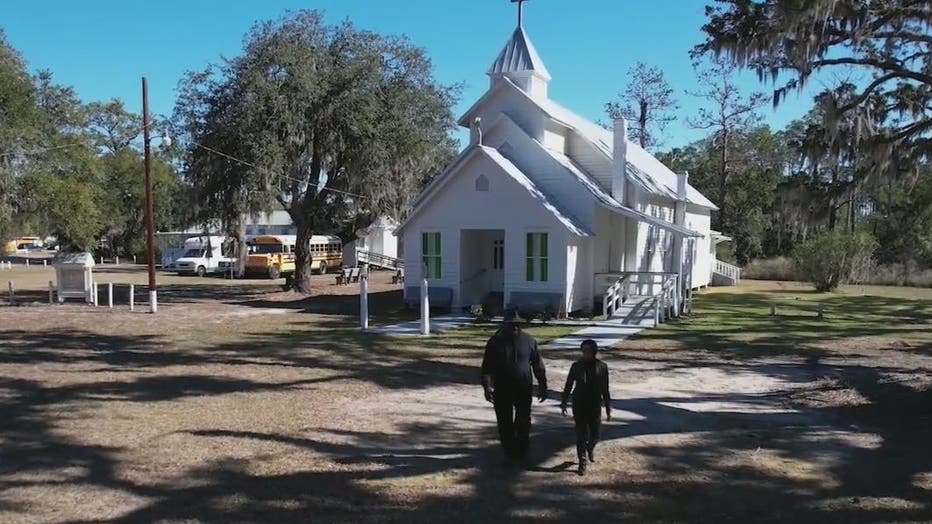Celebrating Black History: The complexities of Georgia’s Sapelo Island

The future of Georgia's Gullah Geechee communities
The Gullah Geechee people are the descendants of West and Central Africans who were enslaved and bought to North Carolina, South Carolina, Florida, and Georgia to work on the coastal rice, Sea Island cotton and indigo plantations. They now make up the one of the country?s most unique cultures, but it is now dwindling in size.
SAPELO ISLAND, Ga. - FOX 5 is dedicated to telling stories of Black History throughout the month of February. FOX 5's Alex Whittler journeyed to coastal Georgia's Sapelo Island where there is an ongoing effort to ensure the people there preserve what their enslaved ancestors worked so hard to attain and keep.
People protect culture by passing down. Without a DNA test or superb documentation, those with enslaved ancestors don’t likely know much about the African country they come from. Slavery stifled that.
"This is my culture," Pete Wilson said while fishing in a Sapelo Island creek one Monday afternoon. "This is my home."
Wilson was born and raised on Georgia's Sapelo Island. He's Gullah Geechee -- an ethnic group from coastal Georgia, Florida and the Carolinas. They've passed down more of their African culture than any other Black community in the US. The Gullah Geechee are known for their basket weaving and distinct African-Creole blended language.
These islanders can easily trace their ancestors. They said the island itself embodies their culture. Its future is what's complicated.
"I would not like to see much change around here, but that's what everybody wants. Change. But it's fine just like it is," Wilson said. "I don't know, might be a little too late to preserve it now."
Wilson's enslaved ancestors once fought to own land on Sapelo. Today's descendants like Wilson said they're doing the same.
The island is 11-miles-long, 4-miles-wide and the state of Georgia owns 97% of it.
RESTAURANT BRINGS UNIQUE TASTE OF THE COAST TO METRO ATLANTA

The only way there is by ferry or to get permission to land at the air strip. The FOX 5 team traveled to Sapelo to tell the people's story, but saw more beaches, and buildings than human life.
To put things into perspective there were about 500 black people on the island in the early 1900s. There are about 50 today. Descendants said 28 of them were born and raised on the island.
Many descendants sell their land and move elsewhere such as Atlanta, and beyond for opportunity and higher education.
"Each time a piece of property is sold the new owners often fence off the road or access to the river," Maurice Bailey, another life-long islander and descendant said. "Now we can go down there...to where we went as kids."
"Each time something like that appears, our history disappears with it," he said. "There's a story behind everything I see."
He recalls fond memories and painful reminders.
Bailey said his ancestors walked in and out of the doors at a plantation that can be rented out today. Some of his relatives still work in the building.
Today, it's known as the Reynold's Mansion after tobacco tycoon R.J. Reynolds. He consolidated Sapelo's land from the 1930s to 50s-- erasing fourteen neighborhoods and displacing the Gullah Geechee to Hog Hammock, the only remaining original settlement.
Descendants said they feel pushed out today too.
The island is dotted with newer homes that sit on stilts in anticipation of flooding. Those risers can cost $30,000 or more. Descendants say it not only changes the historic community but also makes it difficult for them to buy back property.
So, how do descendants keep their land? It depends on who you ask.
"I've seen a lot as far as what we lost. I lost because all the houses we got is a gain, but not necessarily a good gain," JR Grovner said. "It’s not just happened here. It’s happening to Black people across America. They’re being pushed out of their communities. Sapelo just seems different because it’s an island."
He and other born-and-raised islanders have sued over a variety of concerns including increasing property taxes and safer ferry docks.
"You got an 80-year-old person on the island... [who has to] come 200 yards down the road. Stuff like that isn't right," he said.

The suits addressed job discrimination as well. Islanders interested in working on the ferry, for example, have been denied those opportunities.
The residents resolved their claims against the state. The county case is still pending.
By contrast, Bailey chooses to work with the state.
"As opposed to being negative, us suing them," he said. "The county and state are hesitant in helping because of the lawsuits. So they're not sure how to step because people are willing to sue and have already sued them."
"If people don't know the negative how do you fix the negative?" Grovner questioned.
FOX 5 reached out to McIntosh County Commissioner Roger Lotson about the resident's concerns. He's also a descendant. He sent a statement that reads in part:
"I have met and spoken with the residents of Sapelo many times. I share the concerns of Sapelo and all McIntosh County residents as it relates to increasing property taxes. Ultimately property taxes are a function of property value, and that is set primarily by the buyer and seller; an increase in property value results in an unavoidable increase in property taxes.
As a descendant of the Island, I hope the current descendants who own property on Sapelo, will continue to maintain ownership among descendants. However, I acknowledge the selling and buying of individual property on Sapelo, as elsewhere, is a personal decision that each property owner must exercise.
That being said, I will continue to collaborate with residents and talk with local, state, and congressional leaders to pursue ways to assist descendants in the retention of their land."
All the descendants who spoke agreed: The power comes from property ownership and maintenance.
It's a complex situation we've only scratched the surface of in this report-- one that's been passed down to generations through perseverance and preservation.
"Everybody's fighting for the same cause, but that whole thing where it's trying to divide us. Same cause, difference ways instead of just teaming up together and making something really happen," Grovner said.
WATCH: FOX 5 NEWS LIVE COVERAGE
_____

